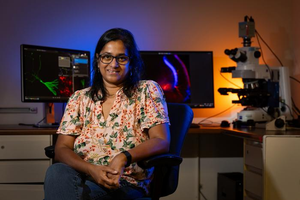New York, January 9 (IANS). A team of researchers led by Indian-origin neuroscientist Viji Santhakumar has discovered a gene that contributes to the development of behavioral changes associated with autism spectrum disease and epilepsy.
A gene called Neuropilin2 encodes a receptor involved in cell interactions in the brain and plays an important role in controlling the development of neural circuits.
The study published in Nature Molecular Psychiatry offers a path to future treatments aimed at alleviating some of the challenging symptoms of these co-occurring conditions.
Previous research has linked mutations in Neuropilin2 to neurological disorders such as autism and epilepsy, but the mechanisms involved have remained largely unclear.
Santhakumar and colleagues at the University of California-Riverside worked on a mouse model to examine the consequences of deleting the Neuropilin2 gene.
In the research, the team found that the absence of Neuropilin2 prevents the migration of neurons, thereby hindering the signals received from the brain.
“This imbalance leads to autism-like behavior and increased risk of seizures,” said Santhakumar, professor of molecular cell and systems biology.
Santhakumar said, “The results of the study highlight how a single gene can influence both systems of stimulants and inhibitors in the brain. We show that disrupting restraint circuit development simultaneously prevents autism-related behavior and epilepsy. Enough to happen.”
The study findings suggest that targeting specific stages of neuronal development may open new doors to therapeutic interventions that could potentially prevent the onset of these disorders.
“By isolating the role of inhibitory circuit formation we may be able to develop therapeutic strategies that can improve outcomes for individuals with autism, particularly those who experience seizures,” Santhakumar said.
Santhakumar along with Deepak Subramanian, Andrew Huang and Sameeksha Komatireddy of UC-Riverside, and Carol Eisenberg, Jeon Beck, Haniya Navid, Michael W. of Rutgers University, led the study. Shifflett and Tracy S. Tran was also included.
–IANS
MKS/CBT










